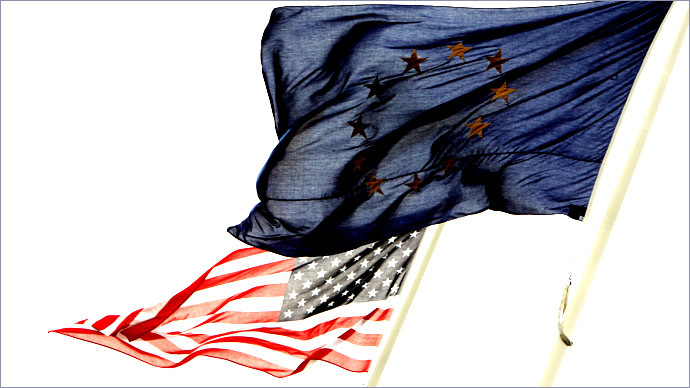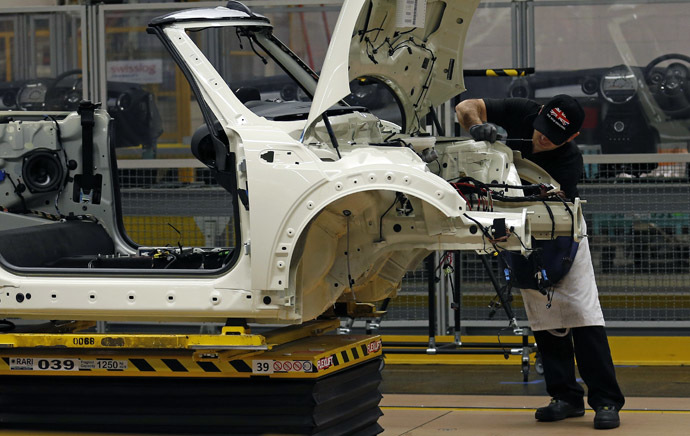Europe spooked by Transatlantic Partnership?

In Sevran, a commune in the northeastern suburbs of Paris, resistance has already begun. Since April 11 the city has been a self-declared area free from TTIP, the Transatlantic Trade and Investment Partnership, the Atlantic replica of NAFTA.
A resolution introduced by the left oriented group Sevran Solidaire et Citoyen has been adopted by a large majority of Sevran's Council. The city is asking the French government to stop the negotiation regarding the creation of a free trade zone between America and Europe that has been ongoing for about 10 months.
In Sevran they believe that the treaty “is not so much about free competition and lack of barriers, it is a threat against our social model and the French way of life: the dismantling of all social and environmental protections, salaries and prices dumping, privatizations, the state attacked by multinationals in private arbitrations tribunals.”
The fear caused by this grim picture is slowly spreading through Europe in spite of the fact that the European media usually shut their eyes in front of it. Furthermore the European elections at the end of May are approaching and the Euro-politicians already besieged by hordes of Euroskeptic national parties don’t want to talk about such a divisive issue. The way in which Brussels has been trying to present the treaty is typical of this Europe that lack a political heart, a Banks Club to whom democracy is to regulate every aspect of life, even a zucchini’s length.
It is nothing less than the hyper-abstract anthropology of neoliberalism, a world of monadic individuals with no social links and solidarity, whose liberty is the freedom to choose from different commodities and the ‘power’ to say everything that pass through their heads to an anonymous crowd that is not listening. A world apparently regulated by the magic hand of the market, but actually an arena in which only the strongest counts and rules, the law of the jungle indeed.
This is more evident in the United States where, as many Scorsese’s movies have demonstrated, the magmatic violence of society is barely covered by a thin peel of formal democracy. The old Europe, with its centuries of bloody wars on its shoulders, needs a thicker peel “to pretend to be somebody else”, as the Randy Newman song ‘Guilty’ asserts. So in the standard European illustration of the would-be treaty everything is displayed in its supreme abstraction, every human event is downgraded and taken under the bureaucratic possibility of being ruled, i.e. its humanity is dialectically destroyed.
In the end everything is falsified because the abstract truth may not coincide with the social truth. If the problem lies with just the simplification and making the commerce among the two Atlantic’s shores less expensive, who can be against this?
Opening up, but what?
If, according to some economists this opening process creates new jobs and boosts the GDPs in the long run: who can be against this? The European and American auto industries clapped their hands to the treaty to the prospect of saving tens of millions of dollars by simplified rules: why not?
But unfortunately the problems are more complex than this. It is this kind of complexity that drove the American media critic Walter Lippmann almost a century ago to lose his faith in the democracy from below and to theorize a kind of bureaucratic-élite class to lead the “bewildered herd.” Even if you are tempted by this kind of theory, as the Eurocracy seems to be, the point is that the autonomy of these specialists is a chimera. The élite also have to submit to the law of the mightier that are currently often the globalized corporations in our world.

Below the attractive logo of free trade a bunch of monsters is crawling, all of them complying with the mimicking of Gresham’s Law: ‘Bad commodities drive out the good ones’. In the pragmatic words of French Left Party’s MP Jean-Luc Mélenchon, “In North America the chickens are washed with chlorine, you will eat chlorine chickens.” And up to now US and EU have still not dealt with many difficult topics such as the genetically modified food that is common in the United States, but still mostly banned in Europe; the hormone-treated beef legal in America and banned by the Union (although everyone knows that there are a lot of unscrupulous farmers that use the hormones also in Europe, it is still illegal).
Ironically a farm animal benefits from very different rights on the opposites side of the Atlantic. For the Lisbon Treaty, animal welfare is part of the European values, while in the US, beef is only a product. Guess which is the strongest view and who is playing defense? You can describe the making of the treaty as an American effort to impose its more pro-business jurisprudence on Europe.
The hidden weapon
But, as the Romans said, in cauda venenum - the poison is in the tail. That is, the worst is yet to come. Among all the challenges that this apparent positive free-everything may be posing to the national way of life of European peoples, one is particularly insidious because it appears to be a technicality, while it is actually a huge political issue. They usually present it by its anodyne initials: ISDS (Investor State Dispute Settlement).
The European Union defines it this way: “Investor to State Dispute Settlement is a legal instrument that allows investors to bring a claim before an arbitration tribunal that the host state has not respected the investment protection rules (under TTIP).” Again the EU (and also the United States trade representative, this is how they defend it) are presenting the facts in their overall abstraction, without including them in a real context in which the balance (the unbalance, to tell the truth) of powers is acting.
Let’s try to give a more concrete view of the problem with the words of Jim Shultz, executive director of the Democracy Center: the ISDI is “little understood weapon” that the corporations “have constructed to defend themselves from the challenge: a vast global web of international trade and investment agreements and a corporate-friendly tribunal system designed to enforce the rights that those agreements grant to corporations.” Politically, the ISDS may become an instrument to “indirectly” force the governments to rule, or not to rule, to the corporations’ benefit, because “international corporations can force governments before international investment tribunals and compel them to hand over hundreds of millions of dollars in compensation. (...) The result is a system that undermines democracy and poses a very serious threat to the future”.
As Lori Wallach, director of the Global Trade Watch, a division of Public Citizen, puts it: “It’s like a quiet, slow-moving coup d’état.” Many arbitration tribunals work without the slightest transparency, if not in secrecy.
ISDS is not an invention of TTIP. The world is covered by a web of over 3,000 bilateral and multilateral trade and investment agreements. In these agreements that are actually building a privatized justice system the corporations see an opportunity to take legal action against the governments when their public policies affect their possibility of business in any way. There are plenty of examples around the world.
Quebec has been hit by a $250-million damage suit after introducing a moratorium on fracking it has been implementing while waiting for scientific studies of the potential impact. Cited from what a Canadian official reportedly told William Greider: “I've seen the letters from the New York and DC law firms coming up to the Canadian government on virtually every new environmental regulation and proposition in the last five years. They involved dry-cleaning chemicals, pharmaceuticals, pesticides, patent law. Virtually all the new initiatives were targeted and most of them never saw the light of day."

You can find several more examples of this kind of arbitration in which the state is the loser in Thomas McDonagh’s study ‘Unfair, Unsustainable and Under the Radar’.
Concerning the ISDI system, even the not-so-revolutionary United Nation expressed its concern “with the current ISDS system relating, among others things, to a perceived deficit of legitimacy and transparency; contradictions between arbitral awards; difficulties in correcting erroneous arbitral decisions; questions about the independence and impartiality of arbitrators, and concerns relating to the costs and time of arbitral procedures.”
With those facts, the official European assurance that “The EU aims to ensure a transparent, accountable and well-functioning ISDS system that reflects the public interest and policy objectives,” sounds a little bit weird. While the EU is ruminating on the provisions of ISDS, citizens have been asked for their views, leading to an example of the Euro-bureaucrats’ surreal concept of democracy: you need a law and economics degree and plenty of free time to complete the questionnaire. Surely the average European citizen should have a lot of difficulties trying to understand it. Judge for yourself: http://ec.europa.eu/yourvoice/ipm/forms/dispatch?form=ISDS
Maybe more tactically than strategically, European politics seems to be slowing its support to the ISDS system, all the more that Australia and Japan have just signed a free trade agreement that does not include an ISDS.
There are signs that the French government and especially the German Government, Europe’s strongman, are considering not to back the ISDS provisions. Karel De Gutcht, the European commissioner for trade, usually not perceived as an ISDS enemy, has said in a recent speech that ISDS system “have raised concerns about the broad scope of some of the existing 3,000 bilateral investment agreements currently applied around the world. To put it more provocatively, the fear has been expressed that these agreements tempt multinationals to bully governments, in particular in small member states, not to adopt certain laws or measures. ISDS has created doubts about whether current investment agreements allow governments the necessary space to regulate in the public interest. Let me state it loud and clear that our primary goal on investment protection is to create a new, improved type of investment agreement. This would make sure that governments can make policy in the public interest while still providing for investment protection.”
Do you recognize the official alienating UE philosophy in the final words? You can have your cake and eat it too. But we have seen that it is actually very difficult to protect investment (or expectation of investments) and the public interest at the same time, especially in a private tribunal. The strongest wins. Guess who.
The statements, views and opinions expressed in this column are solely those of the author and do not necessarily represent those of RT.
The statements, views and opinions expressed in this column are solely those of the author and do not necessarily represent those of RT.













